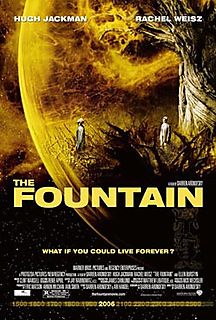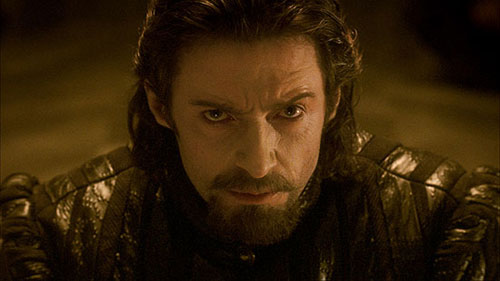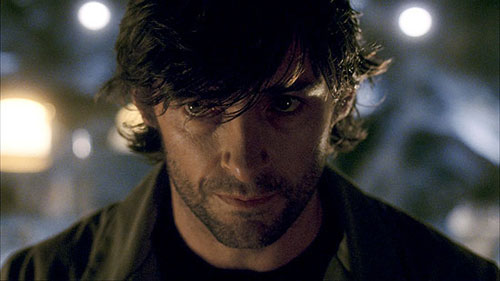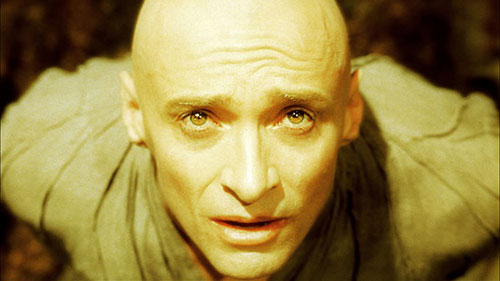 In the jungles of 15th century New Spain, he’s a bearded conquistador. In the operating room of a modern research lab, he’s a driven husband. In the nebula surrounding a dying star, he’s a bald astronaut on his own. In each of these time periods he’s Hugh Jackman, delivering a performance unlike anything we’ve ever seen from him. The movie is Darren Aronofsky’s masterpiece The Fountain, and in many ways this is Jackman’s movie, as he’s in every single scene of the film, at least when he’s not acting against Rachel Weisz or the tree of life.
In the jungles of 15th century New Spain, he’s a bearded conquistador. In the operating room of a modern research lab, he’s a driven husband. In the nebula surrounding a dying star, he’s a bald astronaut on his own. In each of these time periods he’s Hugh Jackman, delivering a performance unlike anything we’ve ever seen from him. The movie is Darren Aronofsky’s masterpiece The Fountain, and in many ways this is Jackman’s movie, as he’s in every single scene of the film, at least when he’s not acting against Rachel Weisz or the tree of life.
Jackman’s been best know for playing Wolverine, and until this year his non X-Men films have been dodgy at best. 2006 has been fantastic for him, though, with fine turns in Scoop, The Prestige and a career-best effort in The Fountain, all finally proving that he has more going on than the charisma and star power we’ve seen. In person that charisma is strong, and he had the women at my roundtable wrapped around his finger. Some of the men, too.
I’ve been talking up The Fountain for months now, and we’re in to the final three days before it’s finally released. This Thanksgiving take a couple of hours and dollars out of your weekend to go to the theater and give thanks that challenging, smart movies still manage to get made and released.
Q: You got started in this how long ago? How did you get involved with Darren?
Jackman: I met him January 04 when he came backstage at The Boy From Oz in New York. I knew about The Fountain, and my partner John Palermo said I should ask him about, this was where it was at, that he was looking to get it up, he’s looking for actors. He really enjoyed the show – I was surprised that he was there, but he’s a huge musical theater fan; he sees everything. He came backstage and I said, ‘I heard about The Fountain and I would really love to read it.’
And he said, ‘I don’t think so.’

He rang me the next day and said, ‘Were you serious about that or were you just saying that how actors say to directors…’ I said, ‘I meant it.’ So he sent it to me and I read it that night and I rang him the next morning and said, ‘Look, I don’t want to be presumptuous but I was so moved by it – if you can wait until September, when my contract finishes, I’m in.’
It wasn’t as easy as that; he showed me some things and then he gave a little speech to me – and any actor would have said yes, but I’m glad I listened to him. He said, ‘I’m going to ask more of you, Hugh, then you’ve ever been asked for on film. I’m going to take you places maybe you thought you would never go to on film. Are you ready to do that?’ I said yeah, and for me that was thrilling. And he did. He worked me.
Q: We heard that you had to do a lot of training – yoga for the underwater work.
Jackman: Yeah, three days underwater. At the end of it I dunked him, though.
We were all wrapped, and I saw him going back from the edge of the pool, because he could tell something was going on. I got out of the pool and I pretended I had a bad knee, pretended I hurt my knee doing the lotus position. I looked over at him and he wasn’t coming forward. He said to the nurse, ‘Go check out Hugh,’ because he knew something was going on. Literally it was ten, fifteen minutes, and finally I laid down and said, ‘Get the stretcher,’ so they got the stretcher to lift me. At that point he came over and as soon as he came over I picked him up and I ran and dunked him in the pool. He was really pissed off, because he knew I was going to do it.
Q: I’ve never seen you be so emotional on film before. Was that something you were worried about, since when you read the script you must have known what the role would call for.
Jackman: Before this I never felt I had a script that warranted that. Yes, it’s always a little frightening – it should be a little frightening for every actor, otherwise it’s not challenging. I knew it was a kind of rawness that he wanted that would be difficult to get to. But at the same time I felt like some of the challenges I had at drama school were bigger than the movies I’ve been getting. Erskinville Kings, the first film I did, had an emotional intensity and rawness to it similar to this, but in between it was six or seven years where nothing demanded it. It wasn’t that I was just looking for a role where I would be emotionally pushed, that’s not a reason to do it. Finally I had a script that had a lot of potential.
Q: You’re playing three incarnations of a character. How do you approach them? Do you approach Tomas the conquistador different from Tommy the scientist and different from Tom the astronaut?
Jackman: There is an essential similarity in what drives them, but physically we wanted to make them different, and not just in look. I created a different physicality for all three. For Tommy I made him like a question mark, we had this image of him as a question mark. Darren and I spent hours in rooms, rehearsal rooms, and I would walk around and around the room, trying different things until we felt it was right. Tommy is very weighed down by the world and what he’s doing. If you look at the film, he’s always hunched over, head forward, like a question mark. His lab is underground, everything is under, under, under. He’s always going down steps. If you look at the design it’s brilliantly done.

Back in time, Tomas the conquistador is a warrior, so while he’s strong and ready to fight, his head is down. He’s like a racehorse – nothing will stop him, he’s got blinkers on. Then Tom in the future has worked out – even though he hasn’t fully come to terms with who he is, he still has some problems – he knows how to be physically at his ultimate. He does tai chi, he does yoga, he meditates. All of these things are about maintaining the physical form, so he’s more about being at ease.
I was doing yoga first of all every morning for a few hours but then also in between every shot. The other thing – I remember this from drama school, one of our teachers said that people hold emotions in their body. If you don’t express them, they get locked in your body. Men have very tight hips – a yoga teacher told me this, which is why the lotus position it was so bloody hard for me to do it – they have tight hips because that is where emotion is stored. Women are generally more emotional and they’re a lot looser in the hips. Certain yoga positions were excruciating, but I had to do them, particularly on those emotional days, I would sit in that position for a half an hour for a time.
My teacher took me to this thing called the Polar Bear Club in Montreal, where it’s minus 25 degrees Celsius, and we would jump into the river. For like a minute we would sit with our head under the river and then we would go to the sauna, the steam room, and do one yoga pose. You would do fifteen minutes in one yoga pose. Then we would jump in the river again. You do that eight times. After three hours it was like… it was an experience everyone should do. I had a bald head at the time, too, so it was amazing. It was like I was on fire. There was steam coming out of my head. It was an incredible feeling.
Q: What was it like shaving your head?
Jackman: Great. I’ve always wanted to do it. I’ve always wanted to swim with a bald head and see what it felt like. But I really have no attachment to my hair at all. I’ve never had the same hair once. For the last fifteen years I’ve dyed it this color, that color, chopped it off, but I’d never been completely bald. I just can’t stop laughing when I see myself. I look like a character out of Lord of the Rings. I look ridiculous, but the feeling is incredible. To have a shower with a bald head is the best way to wake up in the world. It’s heaven.
Q: This year alone you’ve worked with some signature directors – Woody Allen, Christopher Nolan and now Darren Aronofsky. Is there a quality they share?
Jackman: They’ve all got very different qualities. Woody leaves you alone a lot to do your own thing and offers you very little direction. If he doesn’t like it, he reshoots it and then says what he wants. Chris is very low key in a Woody Allen-ish kind of way, laid back and low key. He’s a great communicator, Chris. He has a way of telling you one thing that will completely transform a scene for you and yet leave you to do your own thing.
Darren, we worked together for a year. Every week we would meet once or twice, increasingly as we got up to the film. He had this film in his head for six years – he knew every shot and everything that was going on, and yet he loved that moment of creation, seeing what would happen. It was very interesting – he would run the camera, put a mag on and roll, never cut. He hated that moment, which is true, when you call cut and someone comes in to fix their hair, and because someone is fixing their hair the lighting guy changes a light. Everyone finds something to do, so every time you cut it’s ten minutes. He would just keep rolling the film – a mag is ten to twelve minutes – and he would just put another mag on and tell you to go again. It took him three or four weeks to view the footage when we were finished.
Q: You’re going to be starring in Baz Luhrmann’s Australian WWII epic. How is he so far?
Jackman: Baz is a little bit in the Darren school. We have six weeks of rehearsal before we shoot, we have a workshop in December for a week, and we’ve been working already. I have to do a lot of horse riding in it, and even though I can ride a horse, I have to get to another level, which I’m excited about. He’s full on. I love that. I loved working with all of them, and it’s really whetted my appetite for working with directors who are auteurs, who are visionaries with strong opinions for what they want?
Q: Do you want to direct?
Jackman: I’m too indecisive. I’d be a terrible director. ‘What do you think, Hugh, the red dress or the yellow dress?’ ‘Yeah, they’re great.’ ‘Which one, the red or the yellow?’ ‘I don’t know!’
Q: But you’ve been getting into producing.
Jackman: This is where I’m good as a producer – when I know something, I know it. When I spot a script I know if it will work and I will fight for that to the end. But day to day, directors make 300 decisions. Producers are there to back them up and help them, but when it comes to choosing the right director, you don’t have to do that under duress, you don’t have to do that on the spot, and you don’t have 400 people waiting for you.

Plus I’m liking the partners I’m working with, it really works. We have different strengths. I love it.
Q: How is the TV side compared to the movie side?
Jackman: It’s the golden age of TV at the moment. There are so many great writers and so much talent. And it’s so fast! We, a month ago, pitched to CBS this remake of Blackpool, which I think is fantastic and will translate here. We’re going to do that. Yesterday I was in a room with 30 people doing pre-production – this is a month after they said let’s do it! It’s so fast and exciting and really intoxicating.
Q: Was there anything that you and Rachel worked on that made it into the movie that wasn’t originally in the script?
Jackman: I’m sure we did. The thing is, we spent a year, and I can’t remember now… it all happened, it all came. Our relationship – Darren wanted to create a very real, close bond between these two. It’s a love story, and you have to buy that. But it all just happened on set, and I was very lucky to have Rachel. I’d work with her on anything – she’s incredibly generous.
Q: When you’re on the set, do you have any idea how it’s going to cut together? What are you going on?
Jackman: Trust in Darren. I just see his movies and I know that if it’s a Darren Aronofsky movie, I’m going to see it, no matter what he’s doing. Look – he gave me all the information. I’m being a little facetious, but the movie I ended up seeing was cut very differently. He warned me about that. He said, ‘It’s going to be different than you expect.’ He cut around a lot of things, and the music is so lovely.
But that’s Darren. With a lot of directors you’re not going to let them shoot the whole mag again and again, because you’ll think, ‘I don’t know if this guy’s good enough to know which is the best take.’ But with Darren, you just let it go.
Q: You were in Australia when the film hit the festival circuit and got that polarized reaction. What did you think of that?
Jackman: I was surprised. I shouldn’t have been, in a way, because it’s a Darren Aronofsky movie, and people will always be polarized. But I was surprised that people were vehemently against it. I think even if you didn’t get it or it wasn’t your cup of tea, there’s such artistry, even on a technical level. I would have thought people would have appreciated that.
Again, this is a love story about death and life, and it’s going to touch nerves.
Q: It’s also very earnest.
Jackman: Which is different from what Darren has done before, so people weren’t expecting that. There’s a real purity – it’s a romantic film, even though it deals with difficult subjects. It’s probably uncomfortable at times.
But the best story that never got printed came out of Venice, that infamous screening where people hooted and whistled – it actually broke into a fight. There were fisticuffs down in the front between two people. I thought for a filmmaker that’s the holy grail! That’s awesome!